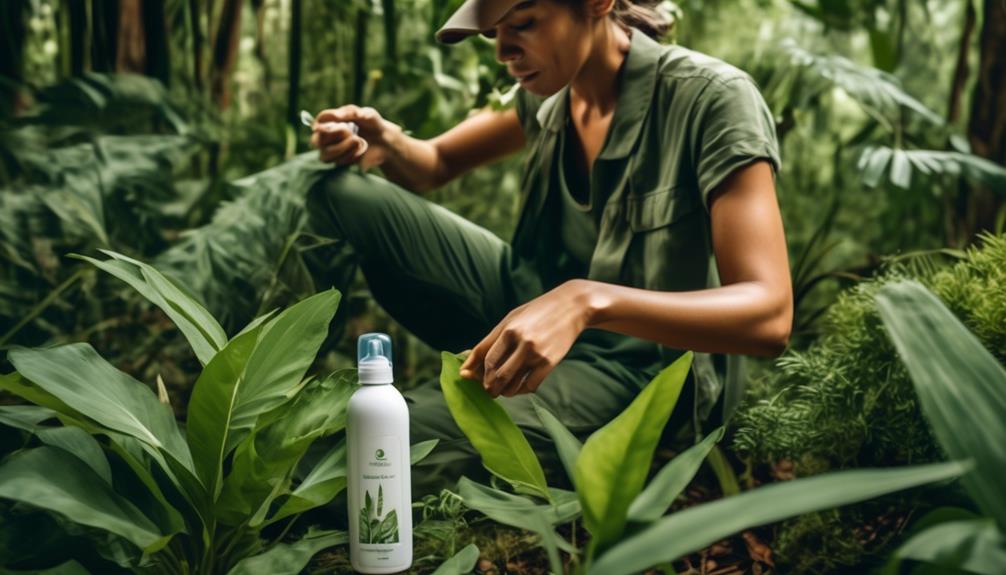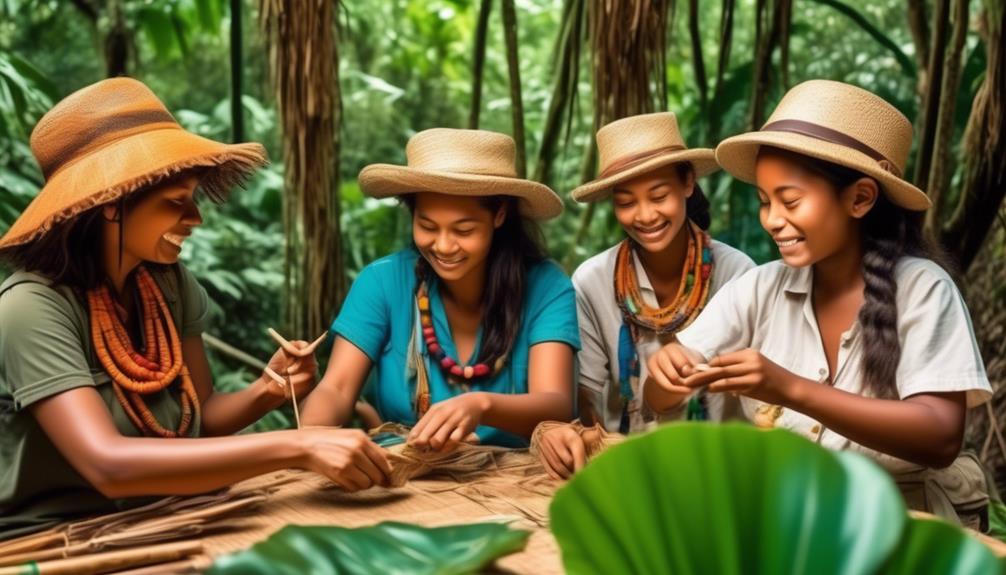15 Tips for Sustainable Eco-friendly Jungle Expeditions
Embarking on a sustainable eco-friendly jungle expedition requires a mindful approach to preserve the natural beauty and delicate ecosystem of the jungle. You're probably aware of the impact of human activities on the environment, but have you considered how your jungle expedition can minimize its ecological footprint?
By implementing a few simple yet effective strategies, you can ensure that your adventure leaves a positive, lasting impact on the environment and the local communities.
Choosing Eco-Friendly Accommodations
When planning your jungle expedition, opt for eco-friendly accommodations to minimize your environmental impact and support sustainable tourism practices. Eco-friendly lodging options are becoming increasingly popular in jungle destinations, offering you the chance to immerse yourself in nature while minimizing your carbon footprint. Look for green accommodation options that prioritize sustainability, such as lodges or resorts that use renewable energy sources, implement water conservation measures, and support local conservation initiatives.
Consider staying in eco-lodges that are built using locally sourced and sustainable materials, blending harmoniously with the surrounding environment. These accommodations often operate with a commitment to minimizing their impact on the ecosystem, while providing guests with comfortable and authentic jungle experiences. By choosing these eco-friendly options, you contribute to the preservation of the delicate jungle ecosystems and support the livelihoods of local communities.
Another aspect to consider is the food served at your accommodation. Seek out places that offer organic, locally sourced meals, reducing the carbon footprint associated with food transportation and supporting local farmers. Embrace the opportunity to savor traditional dishes prepared with fresh, sustainable ingredients, immersing yourself in the local culinary culture while minimizing environmental impact.
In addition to the environmental benefits, opting for eco-friendly accommodations can enhance your jungle expedition by offering unique and immersive experiences that connect you with the natural beauty and cultural richness of the destination. By choosing eco-friendly lodging, you actively participate in sustainable tourism and contribute to the preservation of the jungle for future generations.
Minimizing Single-Use Plastics
To further reduce your environmental impact during your jungle expedition, prioritize minimizing the use of single-use plastics. Reducing waste is crucial for preserving the delicate ecosystem of the jungle.
Here are some practical tips to help you minimize single-use plastics and opt for sustainable alternatives:
- Bring your reusable water bottle: Instead of buying bottled water, carry a durable, reusable water bottle. You can refill it at designated water stations or purify water from natural sources using a portable filtration system. This simple switch significantly reduces the amount of plastic waste generated during your expedition.
- Pack reusable containers and utensils: Consider packing reusable containers for snacks and meals, along with reusable utensils. This reduces the need for single-use plastic bags and cutlery. Opt for eco-friendly materials such as stainless steel or bamboo, which are durable and easily washable.
- Use eco-friendly hygiene products: Choose biodegradable soaps, shampoos, and toothpaste that come in recyclable or reusable packaging. These products minimize plastic waste and are gentle on the environment.
Responsible Wildlife Viewing

For responsible wildlife viewing during your jungle expedition, always prioritize the well-being and natural behavior of the animals. Ethical photography plays a crucial role in this aspect. When capturing wildlife moments, remember to maintain a respectful distance from the animals and avoid disrupting their natural activities. Avoid using flash photography as it can startle or stress the wildlife. Additionally, be mindful of your surroundings and avoid trampling on vegetation or disturbing habitats while trying to get the perfect shot.
Wildlife conservation is fundamental in responsible wildlife viewing. It's important to support wildlife conservation efforts by visiting responsible eco-friendly tour operators and national parks that prioritize the well-being of the animals and their habitats. Choose guided tours led by knowledgeable naturalists who can provide valuable insights into the wildlife while ensuring minimal disturbance to their natural environment. By doing so, you contribute to the conservation of the wildlife and their habitats, ensuring that future generations can also enjoy these incredible experiences.
Sustainable Packing Tips
Prioritize the well-being of the wildlife and their habitats even when packing for your jungle expedition, by adopting sustainable packing tips that minimize environmental impact.
Here are three essential sustainable packing tips for your eco-friendly jungle expedition:
- Pack Eco-Friendly Clothing:
- When preparing for your jungle adventure, choose clothing made from sustainable and eco-friendly materials such as organic cotton, hemp, or bamboo.
- These materials are biodegradable and have a lower environmental impact compared to traditional synthetic fabrics.
- Opt for versatile, lightweight, and quick-drying clothing items to minimize the number of outfits you need to pack.
- Additionally, consider packing clothes that provide UV protection to shield you from the sun's harmful rays, reducing the need for chemical-laden sunscreens that can harm the local ecosystem.
- Choose Biodegradable Toiletries:
- Select biodegradable and eco-friendly toiletries to minimize your environmental footprint.
- Look for biodegradable soaps, shampoos, and insect repellents that won't harm the local water sources and wildlife.
- Avoid products containing microplastics and harmful chemicals that can pollute the environment.
- Opt for reusable containers to store your toiletries, reducing single-use plastic waste during your expedition.
- Use Reusable and Multi-Purpose Gear:
- Instead of single-use items, pack reusable water bottles, utensils, and food containers to minimize waste.
- Additionally, consider bringing multi-purpose gear such as a solar-powered charger, which reduces the need for disposable batteries.
- Investing in durable, high-quality gear that can be used for multiple trips reduces the overall environmental impact of your jungle expeditions.
Eco-Friendly Insect Repellents

When exploring the jungle, consider using eco-friendly insect repellents to protect yourself without harming the environment. Natural alternatives to chemical insect repellents are gaining popularity due to their effectiveness and minimal impact on the ecosystem. Essential oils such as citronella, eucalyptus, and lemongrass are known for their insect-repelling properties and can be used as biodegradable options to keep bugs at bay during your jungle expeditions.
Biodegradable options aren't only better for the environment but also for your skin. Many conventional insect repellents contain harmful chemicals like DEET, which can have adverse effects on both the environment and your health. By opting for natural alternatives, you can avoid exposing yourself and the surrounding wildlife to these harmful substances. Additionally, eco-friendly insect repellents often come in biodegradable packaging, further reducing their environmental impact.
When selecting an eco-friendly insect repellent, look for products that are labeled as biodegradable and made from natural ingredients. These repellents are just as effective as their chemical counterparts and are safer for the environment. Some eco-friendly brands also prioritize sustainability by using recyclable or compostable packaging. By choosing these products, you can protect yourself from insects while minimizing your ecological footprint.
Leave No Trace Principles
Consider incorporating the principles of Leave No Trace to minimize your impact on the jungle environment during your expeditions. By adhering to these principles, you can ensure that your presence in the jungle has minimal impact and helps preserve its natural beauty for future generations.
Here are three important Leave No Trace principles to keep in mind during your jungle expeditions:
- Pack out biodegradable waste: When venturing into the jungle, it's crucial to pack out all biodegradable waste. Items such as food scraps, fruit peels, and other organic materials should be carried out of the jungle to prevent them from disrupting the natural decomposition process in the ecosystem. Even though these items are biodegradable, they should be removed to maintain the pristine condition of the jungle environment.
- Minimize campfire impacts: If you plan on having a campfire during your jungle expedition, take measures to minimize its impact. Use existing fire rings or choose a spot where the impact on vegetation and soil will be minimal. Ensure that the fire is completely extinguished before leaving the area, leaving no trace of your presence.
- Respect wildlife and their habitats: It's essential to observe wildlife from a respectful distance and avoid disturbing their natural behaviors. Refrain from feeding animals or approaching them too closely. Additionally, be mindful of nesting areas and avoid causing any disruptions to the habitats of jungle inhabitants.
Supporting Local Communities

To foster positive relationships with local communities and actively engage in sustainable practices that contribute to their economic development and cultural preservation:
- Make a conscious effort to support local communities through community empowerment and cultural immersion when embarking on jungle expeditions. Seek out ecotourism operators that have a strong commitment to working with and giving back to the local communities. By choosing these operators, you can ensure that your expedition positively impacts the lives of the people who call the jungle their home.
- One way to support local communities is by patronizing local businesses and artisans. Purchase locally made souvenirs, crafts, and products during your expedition. This not only provides economic support but also encourages the preservation of traditional crafts and skills. Additionally, consider dining at local eateries and staying in locally-owned accommodations to directly contribute to the local economy.
- Furthermore, engage in cultural immersion activities offered by the local communities. Participate in guided tours led by community members, attend cultural performances, and learn about traditional practices and customs. By doing so, you not only gain a deeper understanding of the local way of life but also provide economic opportunities for community members.
Eco-Friendly Transportation Options
Utilize eco-friendly transportation options such as electric boats or bicycles to minimize your environmental impact during jungle expeditions. When exploring the jungle, it's essential to consider how you'll move around without leaving a significant carbon footprint. Here are some eco-friendly transportation options to consider:
- Electric Vehicles: Look for jungle lodges or tour operators that offer electric boat tours along rivers and waterways. These electric boats are powered by rechargeable batteries, producing zero emissions and minimizing disturbances to the surrounding wildlife. By choosing electric boats for river excursions, you can experience the beauty of the jungle while promoting sustainable travel practices.
- Bicycle Tours: Many jungle destinations offer guided bicycle tours, allowing you to explore the natural surroundings at a leisurely pace. Cycling through the jungle not only reduces your carbon footprint but also provides a more immersive experience, allowing you to observe the diverse flora and fauna up close. Additionally, bicycle tours contribute to the local economy by supporting bike rental services and community-led eco-tourism initiatives.
- Eco-Friendly Shuttles: Some eco-lodges and tour companies provide eco-friendly shuttle services using electric or hybrid vehicles for land-based excursions. These shuttles minimize air and noise pollution while providing a convenient and sustainable mode of transportation for exploring nearby trails, conservation areas, and cultural sites.
Frequently Asked Questions
What Are Some Alternative Ways to Dispose of Waste in the Jungle, Aside From Minimizing Single-Use Plastics?
When in the jungle, aside from minimizing single-use plastics, consider using composting toilets and biodegradable products. Implement waste management and recycling initiatives to responsibly dispose of waste, minimizing your impact on the environment.
How Can Travelers Ensure They Are Not Inadvertently Contributing to Wildlife Exploitation, Beyond Responsible Wildlife Viewing Practices?
To ensure you're not contributing to wildlife exploitation, consider buying eco-friendly souvenirs and making ethical food choices. Avoid products made from endangered species and support local artisans and sustainable food sources.
Are There Any Specific Items or Materials That Should Be Avoided When Packing for a Jungle Expedition, in Addition to the Sustainable Packing Tips Provided?
When packing for a jungle expedition, avoidable materials and harmful chemicals should be left out. Opt for sustainable clothing and biodegradable products to minimize your impact on the environment and protect the delicate jungle ecosystem.
What Are Some Lesser-Known Ways to Support Local Communities While on a Jungle Expedition, Beyond the Suggestions Provided in the Article?
To support local communities during a jungle expedition, consider engaging with local artisans, learning about sustainable agriculture, and purchasing ethical souvenirs. This fosters community engagement and helps sustain the local economy and traditional crafts.
In Addition to Eco-Friendly Transportation Options, What Are Some Other Ways to Minimize the Environmental Impact of Traveling to and From Jungle Destinations?
When traveling to and from jungle destinations, you can minimize environmental impact by choosing eco-friendly accommodation and sustainable food options. This helps support local communities and reduces your carbon footprint. Make responsible choices for a greener adventure.
Conclusion
When planning your next jungle expedition, keep these tips in mind to minimize your impact on the environment and support sustainable travel practices.
By choosing eco-friendly accommodations, minimizing single-use plastics, and supporting local communities, you can enjoy your adventure while preserving the beauty of the jungle for future generations.
Remember to leave no trace, respect wildlife, and use eco-friendly transportation options to ensure a positive and sustainable jungle expedition experience.
